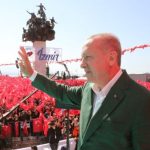BESA Center Perspectives Paper No. 1,155, April 28, 2019
EXECUTIVE SUMMARY: The March 31 elections, which blended victory with defeat for Turkish president Recep Tayyip Erdoğan, put a further brake on Turkey’s stalled membership talks with the EU. The Islamist strongman appears to be the willing political hostage of Turkey’s Grey Wolves.
Two decades ago, the big question in Brussels and Ankara was, “Will Turkey one day become a full member of the EU?” A decade ago, it was, “How soon can Turkey become a full member?” Today, the question is simpler: “Will it be Turkey or the EU that puts an official end to this opera buffa?”
In March, the European Parliament forcefully reminded the West’s Turkey hopefuls that they are wrong. In a non-binding vote, the assembly recommended to suspend accession negotiations with Turkey (370 votes in favor, 109 against with 143 abstentions.) An EU press release after high-level talks with Turkey in Brussels confirmed that accession talks were at a standstill and said that the “Turkish government’s stated commitment to EU accession needs to be matched by corresponding reforms.”
There are plenty of reasons – all open secrets – why Turkey does not qualify to become a member, according to the assembly: ongoing human, civil, and due process rights violations; concern over Ankara’s lack of respect for minority religious and cultural rights; the state’s “shrinking space for civil society,” its arrests and suppression of journalists; its dismissal of dissident academics, as well as its treatment of Middle Eastern migrants within its borders; the government’s abuse of due process rights of its own citizens under the guise of terrorism suspicions; its intimidation of its own citizens; and Turkey’s fractious relationships with neighboring states such as Cyprus and Greece, as well as (the lack of) normalization of diplomatic relations with neighboring Armenia.
The European Parliament said:
[R]espect for the rule of law and fundamental rights, including the separation of powers, democracy, freedom of expression and the media, human rights, the rights of minorities and religious freedom, freedom of association and the right to peaceful protest, the fight against corruption and the fight against racism and discrimination against vulnerable groups are at the core of the negotiation process.
When Europe sent that message, Turkey’s Islamist strongman, President Erdoğan, was touring the country on an election campaign in which he cast his opponents as traitors in league with terrorists. As he spoke to crowds of party loyalists, he screened video of the massacres at two mosques in New Zealand and claimed the mantle of Muslim victimhood.
As if to confirm the European Parliament’s findings about Turkey, he called on New Zealand to restore the death penalty for the gunman who killed 50 people at two Christchurch mosques, warning that “Turkey would make the attacker pay for his act if New Zealand did not.” Speaking at an election rally on March 19, Erdoğan said: “You (Brenton Tarrant, the Australian attacker in Christchurch) heinously killed 50 of our siblings. You will pay for this. If New Zealand doesn’t make you, we know how to make you pay one way or another.”
Ironically, it was Erdoğan who, in order to comply with EU legislation, abolished the death penalty in Turkey in 2004. In the past few years, though, he has declared he would approve it if parliament reinstated it. Erdoğan’s remarks were more problematic than the death penalty aspect per se when analyzed in their full context and from a Western democratic viewpoint: that Turkey will make the attacker pay for his act if New Zealand does not. How? Will Erdoğan send a Turkish team of hit men to a prison 16,500 km away in order to kill an inmate? Will he declare war on New Zealand because Wellington refused to hang the terrorist?
Despite his strong election campaign based on xenophobic, particularly anti-Western rhetoric, the municipal elections on March 31 blended victory with defeat for Erdoğan. His Justice and Development Party (AKP) appeared triumphant (with 44% of the nationwide vote) but lost Ankara, Istanbul, and Izmir, three of Turkey’s biggest cities, in addition to several other traditional strongholds like Antalya, Adana, Mersin, Kırşehir, Artvin, and Bolu. This is the first time Turkey’s Islamists have lost Ankara and Istanbul after 25 years of continuous victory. [Note: The AKP has disputed the vote-counting in both those cities. Legal observers say the Supreme Election Board should announce its final verdict within weeks.]
After the vote, which Erdoğan called during his campaign “an existential matter for Turkey,” his political survivability increasingly depends on support from his main ally, an ultra-nationalist party. Erdoğan’s AKP, together with the Nationalist Movement Party (MHP), won 52% of the nationwide vote on March 31. If Erdoğan comes under pressure to call for early presidential and parliamentary elections (normally scheduled for 2023), he will desperately need the ultra-nationalist vote on his side. To keep that support, he will have to maintain (or even enhance) his anti-Western rhetoric and stay away from any peace talks with Turkey’s Kurds – a genuine red line for MHP. In other words, the March 31 elections put an extra brake on Turkey’s stalled membership talks with the EU, with Erdoğan appearing to be the willing political hostage of Turkey’s Grey Wolves.
Alparslan Kavaklıoğlu a member of Erdoğan’s AKP and head of the parliament’s Security and Intelligence Commission, said in 2018: “Europe will be Muslim. We will be effective there, Allah willing. I am sure of that.”
The EU and Turkey each have their own interest in endlessly prolonging this opera buffa. But the audience is growing increasingly bored.
By Burak Pekdil
Source: Besa Center
Burak Bekdil is an Ankara-based columnist. He regularly writes for the Gatestone Institute and Defense News and is a fellow at the Middle East Forum. He is also a founder of, and associate editor at, the Ankara-based think tank Sigma.


